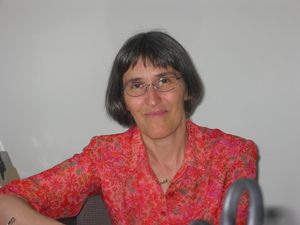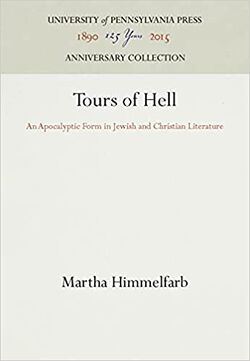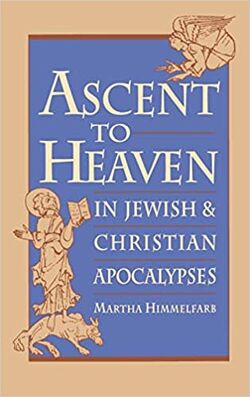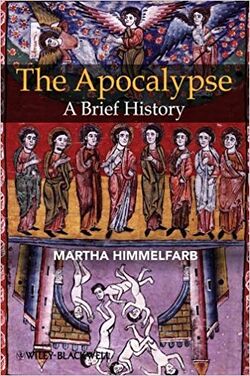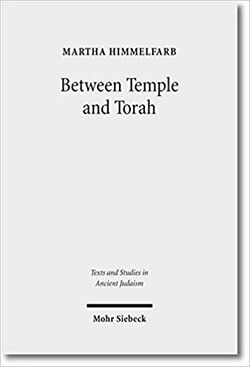Martha Himmelfarb, scholar
Jump to navigation
Jump to search
Martha Himmelfarb is a Jewish-American scholar. Professor of Religions of Late Antiquity in the Dept. of Religion at Princeton University. Member of the Enoch Seminar
-- 1980s --
Martha Himmelfarb, Tours of Hell: An Apocalyptic Form in Jewish and Christian Literature (Philadelphia, PA: University of Pennsylvania Press, 1983)
- "From the ancient Book of the Dead to Dante's Divine Comedy, the living have attempted to describe the world of the dead. Tours of Hell focuses on one form of that attempt: the tours of hell found in Jewish and Christian apocalypses of late antiquity and the early Middle Ages ... Himmelfarb examines seventeen texts, preserved in five languages and spanning a thousand years of human history. These include Hebrew texts and Christian texts in Greek, Latin, Ethiopic, and Coptic, such as the Apocalypse of Peter and the Apocalypse of Paul family. Muslim texts, medieval visions, and other related literatures are also discussed. Himmelfarb details the common elements of the tour tradition, including such features as a hero or heroine figure, a heavenly revealer, and descriptions of the punishments awaiting those who arrive in hell. She convincingly refutes the accepted nineteenth-century critical view of the earliest of these tours, the Apocalypse of Peter, as a Christian form of an "Orphic-Pythagorean" descent to Hades. She place the work instead on the family tree of the tour apocalypse, a genre she traces back to the third century B.C.E. Book of the Watchers (1 Enoch 1-36). Linking the Apocalypse of Peter with later Jewish tours of hell, Himmelfarb reveals significant sin-and-punishment combinations that seem to point to a common source, which she theorizes to be a lost Jewish Tour work of the late Second Temple period ... Rich and fascinating texts seldom before brought to light are treated in detail in this pioneering study. A comprehensive work on the apocalyptic tradition, Tours of Hell will be of great interest to scholars and students of religion, history, ancient and medieval literature, and Dante studies."--Publisher description.
-- 1990s --
Martha Himmelfarb, Ascent to Heaven in Jewish and Christian Apocalypses (New York, NY: Oxford University Press, 1993)
- "This is a study of the ancient Jewish and Christian apocalypses involving ascent into heaven, which have received little scholarly attention in comparison to apocalypses concerned primarily with the end of the world. Recent developments like the publication of the Aramaic Enoch fragments from Qumran and interest in questions of genre in the study of the apocalypses make this a particularly appropriate time to undertake this study. Martha Himmelfarb places the apocalypses in relation to both their biblical antecedents and their context in the Greco-Roman world. Her analysis emphasizes the emergence of the understanding of heaven as temple in the Book of the Watchers, the earliest of these apocalypses, and the way in which this understanding affects the depiction of the culmination of ascent, the hero's achievement of a place among the angels, in the ascent apocalypses generally. It also considers the place of secrets of nature and primeval history in these works. Finally, it offers an interpretation of the pseudepigraphy of the apocalypses and their function."--Publisher description.
- Contents : Introduction -- 1. From Ezekiel to the Book of the Watchers -- 2. Heavenly Ascent and Priestly Investiture -- 3. Transformation and the Righteous Dead -- 4. The Secrets of Nature, Primeval History, and the Order of the Cosmos -- 5. The Apocalypses as Writing
-- 2000s --
Martha Himmelfarb, A Kingdom of Priests: Ancestry and Merit in Ancient Judaism (Philadelphia, PA: University of Pennsylvania Press, 2006)
- "According to the account in the Book of Exodus, God addresses the children of Israel as they stand before Mt. Sinai with the words, "You shall be to me a kingdom of priests and a holy nation" (19:6). The sentence, Martha Himmelfarb observes, is paradoxical, for priests are by definition a minority, yet the meaning in context is clear: the entire people is holy. The words also point to some significant tensions in the biblical understanding of the people of Israel. If the entire people is holy, why does it need priests? If membership in both people and priesthood is a matter not of merit but of birth, how can either the people or its priests hope to be holy? How can one reconcile the distance between the honor due the priest and the actual behavior of some who filled the role? What can the people do to make itself truly a kingdom of priests? Himmelfarb argues that these questions become central in Second Temple Judaism. She considers a range of texts from this period, including the Book of Watchers, the Book of Jubilees, legal documents from the Dead Sea Scrolls, the writings of Philo of Alexandria, and the Book of Revelation of the New Testament, and goes on to explore rabbinic Judaism's emphasis on descent as the primary criterion for inclusion among the chosen people of Israel—a position, she contends, that took on new force in reaction to early Christian disparagement of the idea that mere descent from Abraham was sufficient for salvation."--Publisher description.
- Contents : -- 1. Priest and scribe: ancestry and professional skill in the Book of the watchers, the wisdom of Ben Sira, and Aramaic Levi -- 2. Jubilees' kingdom of priests -- 3. Priesthood and purity laws: the Temple scroll and the Damascus Document -- 4. Priesthood and sectarianism: the Rule of the community, the Damascus Document, and the book of Revelation -- 5. Priesthood and allegory: Philo and Alexandrian Judaism -- 6. "The children of Abraham your friend": the end of priesthood, the rise of Christianity, and the neutralization of Jewish sectarianism
-- 2010s --
Martha Himmelfarb, The Apocalypse: A Brief History (Chichester; Malden, MA: Wiley-Blackwell, 2010)
- "This accessible and enlightening history provides insights into the fascinating genre of apocalyptic literature, showing how the apocalypse encompasses far more than popular views of the last judgment and violent end of the world might suggest. An accessible and enlightening history of the "apocalypses"--ancient Jewish and Christian works -- providing fresh insights into the fascinating genre of literature ... Shows how the apocalypses were concerned not only with popular views of the last judgment and violent end of the world, but with reward and punishment after death, the heavenly temple, and the revelation of astronomical phenomena and other secrets of nature ... Traces the tradition of apocalyptic writing through the Middle Ages, through to the modern era, when social movements still prophesise the world’s imminent demise."--Publisher description.
- Contents : Revelation in the age of the Torah -- The book of the watchers and ascent to heaven -- The book of Daniel and the kingdom of the holy ones -- The heavenly Messiah -- The heavenly temple, the fate of souls after death, and cosmology -- Tours of paradise and hell and the Hekhalot texts -- Eschatology in the Byzantine Empire -- Apocalyptic movements in the modern era.
Martha Himmelfarb, Between Temple and Torah: Essays on Priests, Scribes, and Visionaries in the Second Temple Period and Beyond (Texts and Studies in Ancient Judaism, 151; Tübingen, Germany: Mohr Siebeck, 2013)
- ""This volume contains articles by Martha Himmelfarb on topics in Second Temple Judaism and the development and reception of Second Temple traditions in late antiquity and the Middle Ages. The section on "Priests, Temples, and Torah” addresses the themes of its title in texts from the Bible to the Mishnah. "Purity in the Dead Sea Scrolls” contains articles analyzing the intensification of the biblical purity laws, particularly the laws for genital discharge, in the major legal documents from the Scrolls. In "Judaism and Hellenism” the author explores the relationship between these two ancient cultures by examining the ancient and modern historiography of the Maccabean Revolt and the role of the Torah in ancient Jewish adaptations of Greek culture. The last two sections of the volume follow texts and traditions of the Second Temple period into late antiquity and the Middle Ages. The articles in "Heavenly Ascent” consider the relationship between the ascent apocalypses of the Second Temple period and later works involving heavenly ascent, particularly the hekhalot texts. In the final section, "The Pseudepigrapha and Medieval Jewish Literature,” Himmelfarb investigates evidence for knowledge of works of the Second Temple period by medieval Jews with consideration of the channels by which the works might have reached these later readers."--Publisher description.
- "Martha Himmelfarb befasst sich in ihren Aufsätzen mit dem Judentum zur Zeit des zweiten Tempels und der Entwicklung und Rezeption der Bräuche in der Spätantike und dem Mittelalter. Im Abschnitt über "Priester, Tempel und die Tora" behandelt sie dessen Titelthemen in den Texten der Bibel bis hin zu denen der Mishna. Der Abschnitt "Reinheit in den Schriftrollen vom Toten Meer" enthält Aufsätze, die die Intensivierung der biblischen Reinheitsvorschriften, vor allem die Gesetze bezüglich des Genitalausflusses, in den wichtigsten Rechtsakten der Schriftrollen thematisieren. In "Judentum und Hellenismus" untersucht die Autorin die Beziehung zwischen diesen beiden antiken Kulturen, indem sie die historische und die moderne Geschichtsschreibung des Makkabäeraufstands und die Rolle der Tora in antiken jüdischen Adaptionen der griechischen Kultur betrachtet. "Der Aufstieg in den Himmel" prüft die Beziehung zwischen den Aufstieg-Apokalypsen zur Zeit des zweiten Tempels und späteren Texten, in denen der Aufstieg thematisiert wird, vor allem in der Hekhalot-Literatur. Im letzten Abschnitt, "Die Pseudepigraphen und mittelalterliche jüdische Literatur", untersucht Martha Himmelfarb die Kenntnis jüdischer Gelehrter im Mittelalter von Arbeiten aus der Zeit des zweiten Tempels. Außerdem betrachtet sie die möglichen Verbreitungswege, über welche die Texte diese späteren Leser erreicht haben könnten."--Publisher description (German).
